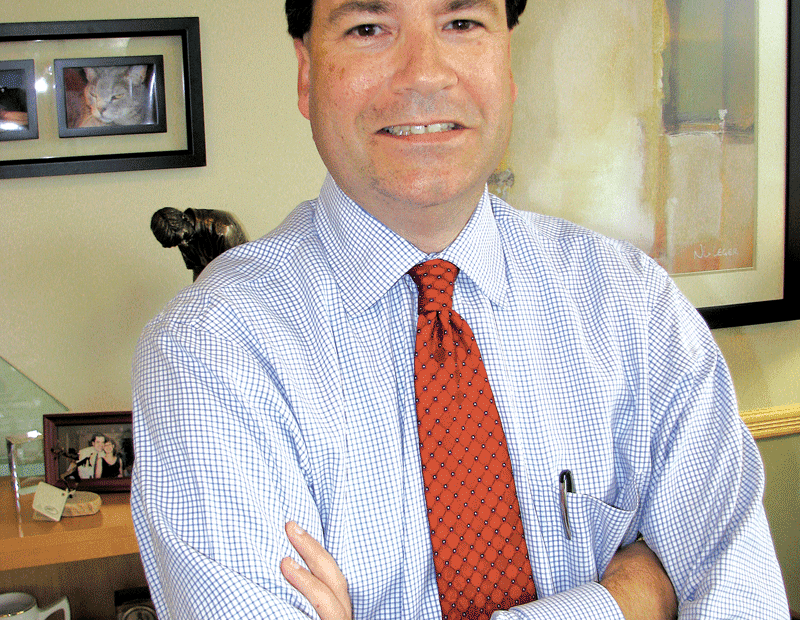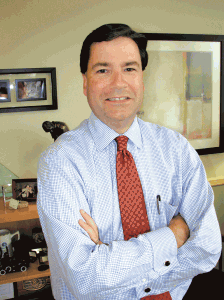
Profiles in Business
This Local Banker Makes Several Points of Interest
Tom Creed recalls having a number of intriguing summer jobs while growing up in Longmeadow.
He caddied and worked in the bag room for several years at Longmeadow Country Club I think I probably learned as much about business from being a caddy as I did from being in business and spent a few memorable summers at what was then Riverside Park, now Six Flags, as an operator of the iconic wooden roller coaster called the Thunderbolt. Maybe his lasting memory was from one night when the ride was shut down for repairs.
We were thinking that maybe we would get to go home early, said Creed, senior vice president and commercial regional executive for Berkshire Bank. But it was Saturday, and the park was pretty crowded. Our supervisor came over to me and said, I need you to go out the parking lot and drive one of our double-decker buses for the rest of the night.
I told him Id never driven a double-decker bus before and that I didnt even know how to drive a standard transmission but if he wanted me to give it a shot, Id give a shot, he continued. I pull the bus out of its parking spot, and in the process, I take out about six feet of fence with the mirror. I thought for sure the guy was going to throw me out, but instead he looks at me and says, thats better than the last guy keep going.
But it was one of Creeds later employment opportunities, or what he called his first real summer job, that would ultimately shape his career path sort of. It was as a teller at the Forest Park branch of Springfield Institution for Savings (SIS), now TD Bank. He said it taught him a little about banking, but much more about customer service, especially on what he called Social Security day, when the place was packed.
I say this to people all the time: that teller job is still the hardest job in banking, he told BusinessWest. You have no idea what youre going to be presented with; you have no idea what customer is going to come to you, when theyre going to come to you, or what theyre going to ask of you. And whatever it is, theyre going to want it right then, and theyre going to want it perfectly. Thats the pressure a teller is under; its a tough job.
The worst part of the day was the end of the day when you had to balance your drawer, he continued, and you had to hit that enter button and hope that the number that came up was the one that was supposed to come up.
Creed has gone on to have to have a number of jobs in banking, as well as a six-year stint away from the industry working for a local manufacturer (more on that later), during which he said he learned more about the financial-services sector than he did in the previous 15 years when he was in it.
He said it took him a long time to figure out what he wanted to do with his professional life, but he eventually came to the conclusion that it is banking, or at least that aspect of it that enables him to work with people to help them achieve goals and solve problems, that he enjoys most.
I missed the client relationships thats why I wanted to get back into banking, he said. I like being in the position where youre always exposed to different people and different businesses. I enjoy being able to spend part of my day on a real-estate transaction and another part helping a manufacturer with a working-capital challenge. Its the fun part of banking.
For this, the latest installment of its Profiles in Business series, BusinessWest talks at length with Creed about banking, the recession, those business relationships he mentioned, and the fact that hes quite sure its a question of when, not if, he and his wife, Nancy, will retire to Key West.
Points of Interest
And as far as shes concerned, the sooner the better, he said, adding that both of them love the laid-back lifestyle in the place where they now spend just one week a year. Ive spent a lot of money on suits in my life; Im looking forward to the day when I dont have to spend on one again.
That day is still a ways off, though, and Creed must still pull a suit from the closet each morning and also contend with a recession that may be officially over, according to some economists, but is still having quite an impact on Western Mass. and its business community.
The challenge were still going to have is that there are a lot of people who have just been hanging on, he explained. Even the little bits of improvement were seeing in the economy are not enough to get them through 2010. This is still going to be a tough year for a lot of people, not to mention the 15% unemployment that continues to exist in Springfield.
But there are signs of improvement, he continued. I have one customer in HVAC; he tells of how, in 2008, he installed 70 furnaces, and in 2009, he installed seven. But in 2010, his phone is starting to ring again, and not just because someones furnace is busted.
Creed speaks from experience when it comes to banking and economic downturns. Hes been through several in a career that started with Shawmut in Springfield soon after graduating from the University of Vermont in 1985. The economy was quite sound then, Creed recalled, and jobs were plentiful, even for a political science major whose grades were pretty average.
Still not at all sure what he wanted to do when he grew up, he sought out bank training programs, thinking one would give him exposure to many different industry groups and help him choose a career path. I suppose you can say I still havent figured it out, because 25 years later, Im still in banking.
Creed eventually chose Shawmuts training program, and began as a commercial credit analyst. He later ascended to vice president and team leader, with other stops as commercial loan officer, assistant vice president, and vice president.
During that 10-year tenure, Creed saw the financial-services sector get turned upside down as the recession of the early 90s and real-estate collapse forced some to banks to close, others to fight for survival, and all of them to call in loans, pare staff, and change how they did business.
It was pretty awful back then, he recalled. It was tense; you spent most of your day nervous because even the best of customers were having trouble paying their bills, not unlike the environment were going through today. Especially as a younger lender, you take a lot of that personally because you think youve done something wrong when loans start going sideways, and it makes you nervous. The better lenders are the ones who are more nervous, because they take their job seriously.
That was a dreadful time, and at the peak of that recession, I could never imagine us ever seeing it happen again, he continued. But I remember a colleague of mine, whos still lending today he and I were working together at Shawmut and standing on the platform on State Street, and he said, Thomas, trust me, there will come a time when everyone forgets all this and well go through it all over again. And sure enough, he was right.
Indeed, while times are not as bad as they were 20 years ago, especially in this market where banks did not participate in subprime lending, many institutions are forced to again look at how they do business, and make changes. These days, said Creed, banks of all shapes and sizes are simply being more careful when it comes to lending. When asked what that meant, he said banks are always careful, but in this climate, theyre paying even more attention to the fundamentals.
You assume nothing, you check, you double-check, and you triple-check, he explained. Youd like to think that you do that all the time, but youre reminded to do it more in these times than you would in others.
After a 10-year stint at Shawmut, Creed moved on to First National Bank in Springfield and then to Citizens Bank in Boston, where he served as vice president. He was there only a year, because quality-of-life issues were pulling him and Nancy back to the Pioneer Valley, and a job offer from West Springfield-based Omniglow sealed the deal.
I had a good job at Citizens and was working with good people, but its expensive to live out there, he recalled. When we started to think about how we wanted to live and how far outside Boston we were going to live to afford it, we were already halfway home.
So they came all the way back, to work, but also to become quite involved in the community.
At Omniglow, Creed was vice president of corporate development, a job that took him to China for a few weeks every quarter, and also gave him invaluable insight into the banking industry from the other side of the table, as he put it.
Within the community, Creed is currently president of the board of directors for the Springfield Symphony Orchestra, and has been a supporter of the SSO for many years. Hes also on the board of the YMCA of Greater Springfield, set to become vice chair in May. Hes also been involved with the Affiliated Chambers of Commerce of Greater Springfield for some time (he was chairman of its legislative steering committee for five years), and is active with the Regional Employment Board of Hampden County and the Holyoke Redevelopment Authority.
The Bottom Line
Creed says he has a number of attractive options for the time when hes not working on the job or in the community. They include the SSO (and classical music in general), the Red Sox, Jimmy Buffett concerts, golf (although he says hes not very good), and more.
And then, there are vacations, and especially that week at the timeshare in Key West. Ultimately, hes longing for the day when, as he says Nancy puts it, thats the first of 52 weeks and when he can thankfully stop spending money on suits.






